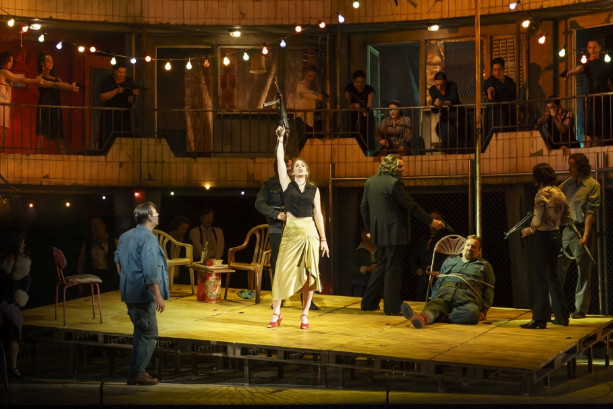
Welsh National Opera have once again come to Birmingham Hippodrome to showcase their quality. Carmen is the first of three full scale operas, with Rigoletto and The Cunning Vixen following on successive nights. Judging by tonight’s performance of Carmen, the WNO’s visit to our region should prove a triumphant endorsement of their well-established reputation for class. What especially impressed me was the maturity of the interpretation of this opera, one of the most performed and popular in the repertoire.
Not far off 150 years old, Carmen was a controversial play at its premiere, and there remain unresolved moral aspects of a different kind today. For years the central character has been both vilified and celebrated in equal measure for being a woman of unchaste virtue, for daring to have the liberty to control of her own sexuality. Some productions have placed too heavy an emphasis on sexing-up the character. Welsh National Opera has taken a mature approach, simply representing Carmen as a strong independent woman with a capricious nature. Yes, she is feisty and sassy and attractive, but this is not overdone. As such she can be taken seriously, not as a stock-character femme fatale, but simply as a modern woman. Rather, the ‘moral correction’ of her fate is called into question. This is a tale in which she is stalked and killed by her jealous spurned lover. In this production the feeling of reprehension against Don José’s controlling domestic violence came across strongly.
Both main characters, Carmen and Don Jose played by Virginie Verrez and Dimitri Pittas respectively, gave wonderful performances. Verrez carried herself as confident and self-willed, and a fighter for her rights. Her singing was flawless, possibly helped by her performing in her native French. Her acting, full of ease and spontaneity, won me over. With Verrez, Carmen is so much more than a loose sex kitten. Pittas did a great job of being a weak and troubled man, ironically by singing with anything but a weak and trouble voice. He played the role as dark, serious, foreboding, and ultimately obsessed. The resulting emotional response at the end of the opera was one of sympathy for Carmen and antipathy for the character of José. Quite a reversal of the reaction of the original Parisian audience, who by all accounts were shocked and scandalised by the sexualised character of Carmen. I should also mention here the two main supporting roles, which were performed with great panache by soloists Anita Watson as Micaëla and Phillip Rhodes as Escamillo. They are two strong Antipodean performers who complimented the main roles and gave the company a depth of field.
The maturity of the production owes much to the director, Jo Davies, and its revised setting in an unnamed South American country. The era is also non-specific, although the wardrobe and props suggest post-WW2, anything from the 1950s to today. The staging by Lee Travers is a rather ingenious, able to evoke the low-class favelas of Brazil, a bullfighting arena and a barracks. This separation of the narrative from its original location and historical context allows the character interpretations room to develop. The multi-tiered set structure allowed for interesting stage direction, with the full cast able to disappear and reappear elsewhere without the audience being able to keep track. This was very effective, particularly with such a big chorus enlarged by a contingent of over a dozen gifted young performers.
As mature and ingenious as the production was, the overall impression for me was one of great musical quality. From the brilliantly talented musicians under the baton of conductor Tomáš Hanus, to the wonderfully harmonious voices of each soloist and chorus member, there was nothing here that was anything other than top notch. ★★★★★ Robert Gainer 6th November 2019

